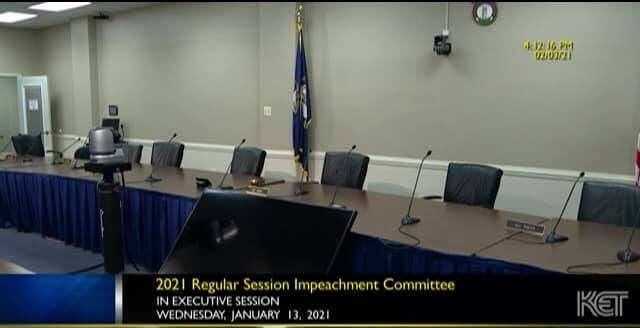
An Impeachment Committee meeting on February 3 ended abruptly when members emerged from a marathon 3.5 hour closed session to take no action on the undisclosed matters they discussed.
https://ket.org/share/legislature/archives/?nola=WGAOS+022052&stream=aH…
The meeting commenced at 4:05 pm with announcements by Chairman Jason Nemes relating to receipt of the Cameron and Goforth impeachment petitions; receipt of responses and replies in the Cameron impeachment; the filing of several motions in the Cameron impeachment; receipt of the documentation requested from Governor Beshear; and the filing and receipt of two new Beshear impeachment petitions to be known as petitions 2 and 3.
The committee thereafter unanimously approved a motion to make these documents "public." Chairman Nemes indicated that staff would be directed to post them on the LRC website.
The chairman briefly addressed a motion that he recuse himself in the Cameron impeachment, denying that motion without comment.
At 4:11 pm, the committee went into closed session.
The committee returned to open session at 7:52 pm. Chairman Nemes' brief comments were inaudible to the remote audience due to an apparent mic malfunction.
Lexington Herald-Leader staff writer Daniel Desrochers — who must have been physically present — tweeted, "No action has been taken on the petition but all of the motions filed in the impeachment petition have been declined," presumably in closed session.
https://twitter.com/drdesrochers/status/1357129489382268930?s=10
Desrochers also noted that Nemes did not offer "much by way of explanation. But boy the committee members seemed tense...."
That much was clear even to remote viewers.
What was even clearer — at the close of a nearly four hour meeting conducted almost entirely behind closed doors — was that Chairman Nemes had all but abandoned his claim — made at the Impeachment Committee's first meeting — that the proceedings would not be conducted "behind closed doors."
"Anything we do," the chairman announced in the January 13 meeting, "will be open."
The hours spent in closed session suggest otherwise.
The meeting underscored other open government issues.
1. While it is commendable that the committee is proactively posting impeachment records on the LRC website, this makes the records no more "public" than they already are.
The alternative to proactively posting on the LRC website these nonexempt "public records" — as that term is expansively defined in the open records law — would be to produce them in response to an open records request. Proactive posting facilitates timely access and generally spares LRC the time and labor associated with responding to open records requests for the records
But the committee's vote to "make these documents public" by posting them does not transform them from nonpublic to public.
The open records law — not an act of the Impeachment Committee — makes them public records.
https://apps.legislature.ky.gov/law/statutes/statute.aspx?id=45231
2. The audio problem that disrupted the conclusion of today's meeting would have, in any other case, necessitated the suspension of the meeting until the problem was resolved.
This requirement appears in KRS 61.826, parts of which were temporarily modified by 20RS SB 150.
https://apps.legislature.ky.gov/law/statutes/statute.aspx?id=47297
https://apps.legislature.ky.gov/record/20rs/sb150.html
The statute states that "Any interruption in the video or audio broadcast of a video teleconference at any location shall result in the suspension of the video teleconference until the broadcast is restored."
But this statutory requirement, too, seemed of little concern to the committee.
Not terribly surprising given reports that Representative Josie Raymond was denied the right to remotely cast a vote during an Agriculture Committee meeting earlier in the day. The open meetings law, as temporarily modified, recognizes no distinction between members participating in person or remotely.
https://twitter.com/repjosieraymond/status/1356987186982260739?s=10
Just another example of laws made to apply to every public agency other than the agency that enacted them.
3. It is becoming increasingly apparent that final action on matters of great importance — "declining" motions, for example, — is and, perhaps going forward, will be taken in closed session.
In general, final action is impermissible in closed session under KRS 61.815(1).
The Coalition has explained that the judicially untested interpretation of the language found in KRS 61.815(2) may relieve the Impeachment Committee — a "non-standing" committee of the General Assembly — from the KRS 61.815(1) prohibition on closed session final action.
https://www.facebook.com/419650175248377/posts/854196118460445/?d=n
https://apps.legislature.ky.gov/law/statutes/statute.aspx?id=23045
But the legal likelihood that it *does* permit the Impeachment Committee to take final action in closed session does not mean that the committee *should* take final action in closed session.
Open meetings laws are all about the right of the public to observe the debate leading up to final action — the competing points of view expressed and how each official votes — referred to in the open meetings law as "the formation of public policy" and declared by the legislature to be "public business."
https://apps.legislature.ky.gov/law/statutes/statute.aspx?id=23042
Why so blithely abandon these laws, and the policies that support them, now?
In this of all moments, can we afford to be so cavalier about open government laws enacted to promote public trust?


